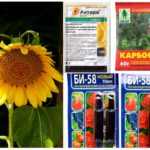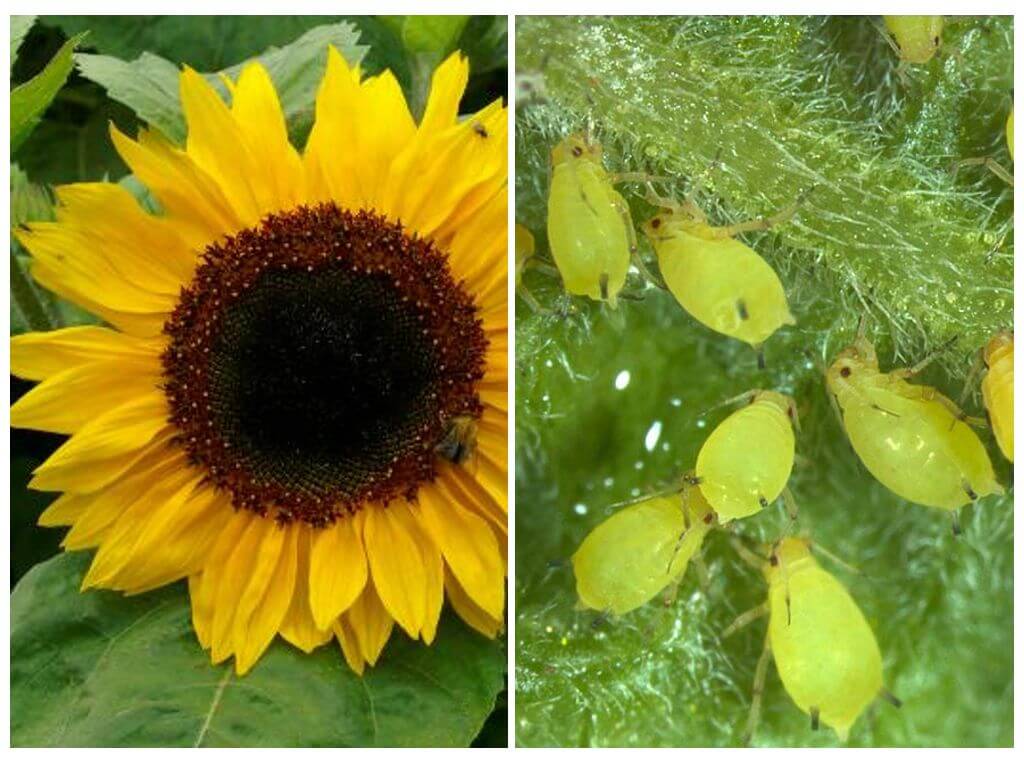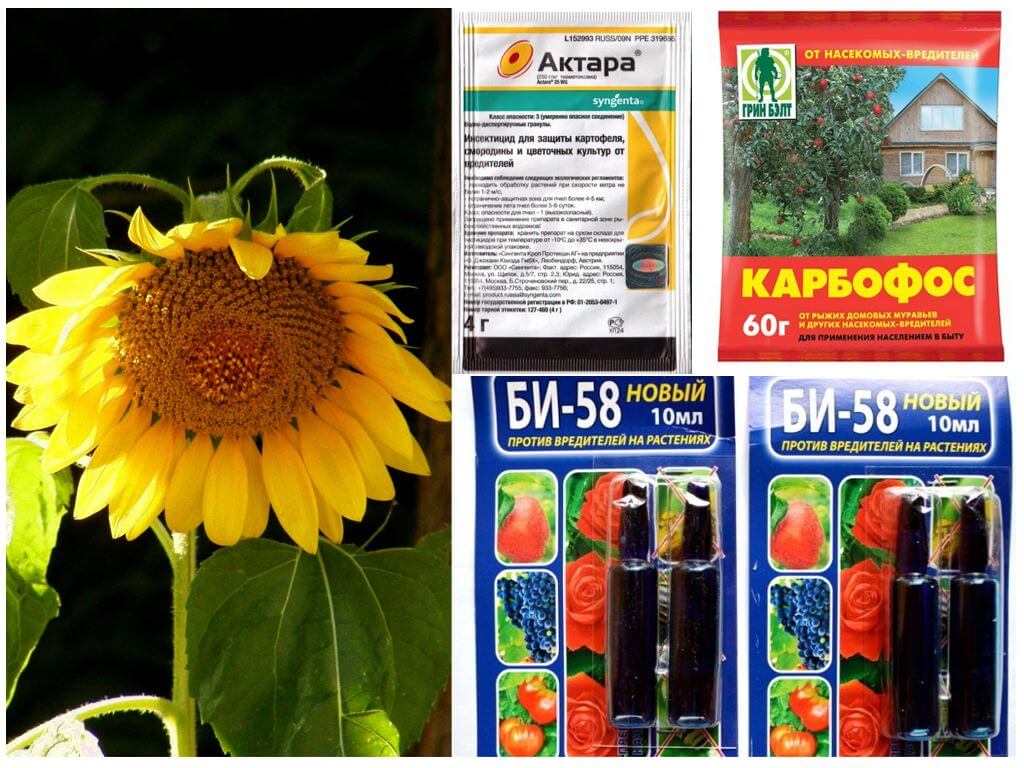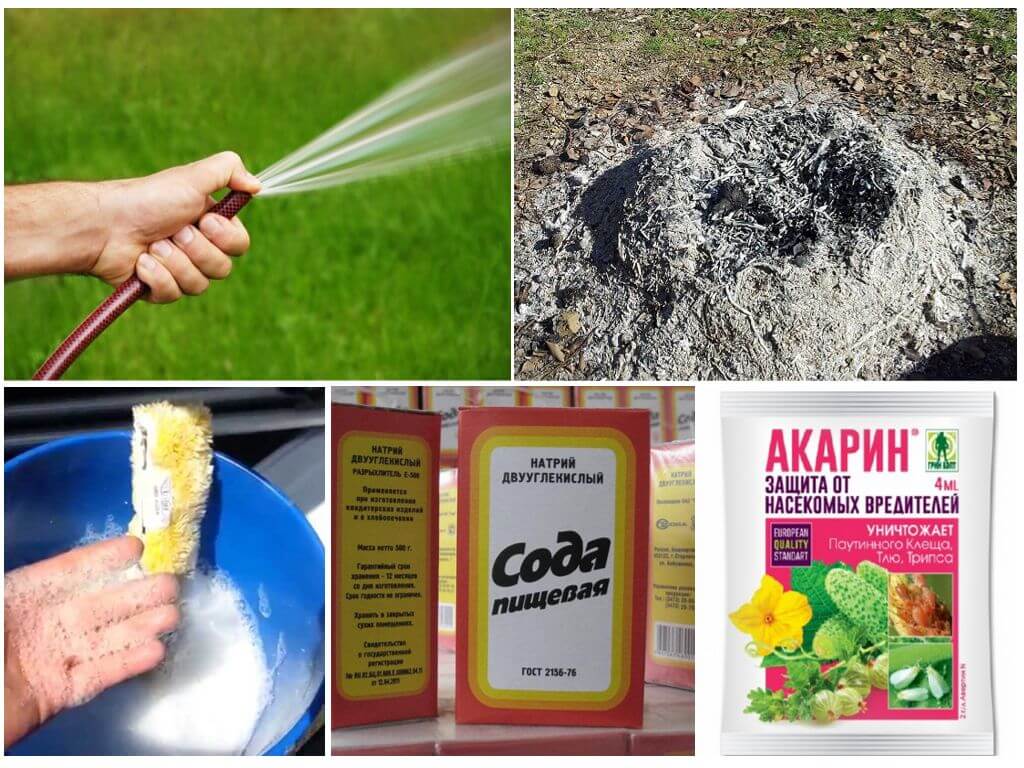How to deal with aphids on sunflower
Content
- Aphid on sunflower
- Toxic chemicals from aphids on sunflower
- Different ways of dealing with aphids
Despite the fact that the sunflower is an annual, but powerful enough plant, it can be attacked by many different harmful insects. One of these is aphid - small bug that can significantly affect the quality and quantity of the harvested crop. Piercing the surface of shoots, leaves or buds, insects suck proboscis juice.Massive damage done by aphids does not allow the plant to open the bud of the basket and go into the flowering phase, as a result of which it fades. Therefore, if aphid appeared on sunflower, urgent measures should be taken.
What aphid strikes a sunflower
Sunflower can infect different types of aphids:
- peach;
- beet;
- euonymus;
- acacia.
Helichriz aphid, an insect with a wide ovoid green body up to 1.5 mm in length, is a particular danger for planting. First, the aphid turns yellow, then becomes a greenish-brown color. A photo of helihrisov aphid is presented below.
On a note!
Winter pest spends on fruit trees, with the advent of spring migrates to the sunflower. It is especially dangerous for the plant during the formation of buds. The pest affects young leaves on sunflowers, from which they become wrinkled, curled and fade.
One of the most common pests of sunflower is beet aphids - insects up to 3 mm, preferring to live in a warm climate. Its first generation hits viburnum and jasmine, with the appearance of winged migrants in the second or third generation, sunflower, potatoes, beets and beans suffer.
Ways to fight
Measures to combat aphids in sunflower are to apply chemical (store) drugs and folk remedies. Moreover, the latter are much cheaper and safer, but they only get rid of pests for a while.
Chemicals
With an excessive number of insects without chemical agents can not do. Toxic chemicals are:
- System action. These are the most effective of all chemical means, however, and the most dangerous - when green plantings penetrate into the plant tissue, their juice becomes poisonous to insects. Preparations of this class are recommended for use when it is not possible to get rid of aphids by other means. This is ideal for use in rainy weather, as well as for processing tall trees. The disadvantages of such funds include a long waiting period for the effect (about 2-3 weeks). A more rapid impact of the drugs in this category has Aktara remedy - an effective remedy for helihrisova aphid, which affects large areas, as well as Tanrek.
- Contact action. Affect aphid affecting sunflower, with direct contact.An insecticide penetrating into the body blocks the work of the nervous system. Those individuals who managed to avoid the procedure of destruction by contact drug, begin to multiply with double speed. This nuance is the only flaw in these pesticides. Drugs of the following brands are in great demand among gardeners: Fufanon, Fury, Karbofos and Arrivo.
- Intestinal action. The preparations of this group act on the digestive system of insects, entering their bodies through the organs of nutrition. Manufacturers were able to enhance the effect of these funds by combining their composition with contact action drugs. The most popular in this series are Bi 58 New, Confidor.
When using chemicals you need to know the following nuances.
- Use insecticides against aphids on sunflower should be only with an excessively large accumulation of harmful insects. After all, along with aphids, poisonous components also destroy beneficial insects.
- To prevent chemicals from getting used to pests, they must be alternated periodically.
- It is not recommended to make chemical treatment during the flowering period of sunflower.
- The first treatment is preferable to carry out before the dissolution of the kidneys, which will help destroy part of the overwintering eggs of the pest.
Folk remedies
With a slight defeat sunflower aphid to get rid of the pest, you can use folk recipes.
Mechanical method
Perhaps the simplest and at the same time the most time-consuming way to get rid of a pest is washing the sunflower leaf plates with a strong jet of water.
Soap solution
A more pronounced effect can be achieved by treating sunflower leaves with soapy water. For its preparation it is preferable to useeconomic, tar or liquid soap.
Herbal infusions
The smell of onion, garlic, tobacco, as well as chamomile, marigolds or dandelions perfectly repels aphids. It is enough to plant these plants around the perimeter of the field with sunflowers to collect a full harvest. You can also use plant repellents for making infusions, which should be sprayed with infected sunflower.
Ash
Get rid of aphids in the sunflower will help ash. It is also used to prepare a solution that is used to treat the leaves damaged by the pest. And to maximize the effect, a liquid or laundry soap is added to the solution.
Ammonia
Gives no less effective result in the fight against harmful insects ammonia. Just one spoon of this substance is enough to prepare 10 liters of a solution that is destructive to aphids. They should spray infected sunflower daily.
Soda
Another effective folk remedy against aphids is soda. In a liter of water dissolve a spoonful of soda and spray the damaged sunflower leaves. You can also add a little soap to it.
Hydrogen peroxide
An excellent preventive measure against aphids and mold, the appearance of which contributes to the presence of pests, is hydrogen peroxide. To prepare the solution it is combined with alcohol and dishwashing liquid.
Other means
No less popular means are:
- milk and iodine;
- Coca Cola;
- vinegar;
- garlic;
- celandine;
- mustard;
- vodka;
- Green soap;
- Birch tar;
- tobacco;
- boric acid.
Biological preparations
Biological preparations are effective in fighting aphids due to their special bacteria. Although they are less effective than chemical ones, they are completely harmless. These include: Akarin, drug Spark, Intavir, Fitoverm, Aversektin.
Whichever of the above means you choose, it is better to spray the sunflower from aphids in dry and windless weather.











